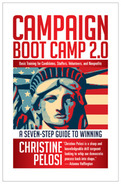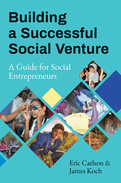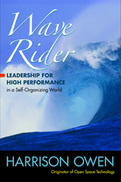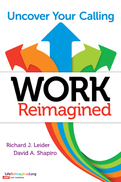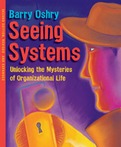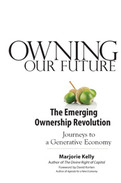Campaign Boot Camp 2.0 is basic training for future leaders who hear a call to service—a voice of conscience that springs from their vision, ideas, and values—and want to translate that call into positive change. Pelosi outlines the seven essential steps to winning: identify your call to service, define your message, know your community, build your leadership teams, raise the money, connect with people, and mobilize to win. Each chapter concludes with a “Get Real” exercise so readers can personalize and integrate these ideas into individual efforts.
In this edition, Pelosi updates the book's “Call to Service” profiles of political leaders and their calls to service; details the expanding role of social media, the Internet, and technology as message multipliers; explores challenges unique to women candidates; and expands on the power of volunteers.
- Detailed, practical advice on how to win any kind of campaign
- Written by a veteran activist with a lifetime of experience running campaigns at every level
- Updated throughout, including new information on using social media, challenges unique to women, and the power of volunteers
My political activism began in the stroller, writes Christine Pelosi. As the daughter of Congresswoman and former House Speaker Nancy Pelosi, Christine is almost literally a born campaigner. She knows politics and policy inside out: shes served as an attorney in the Clinton-Gore administration, on Capitol Hill as a Congressional chief of staff, and as a San Francisco prosecutor. She has conducted boot camps in over thirty states and in three countries, working with dozens of successful candidates for office from city council to US congress. In Campaign Boot Camp 2.0, Pelosi presents leadership lessons from the campaign trail from a diverse array of over forty public figures, lending advice for anyone who wants to run for office, advocate for a cause, or win a public policy issue.
Campaign Boot Camp 2.0 is basic training for future leaders who hear a call to servicea voice of conscience that springs from vision, ideas, and valuesand want to translate that call into positive change. Pelosi offers the seven essential steps to winning: identify your call to service, define your message, know your community, build your leadership teams, raise the money, connect with people, and mobilize to win. Each chapter concludes with a Get Real exercise so readers can personalize and integrate these ideas into individual efforts.
In this edition, Pelosi updates the books Call to Service examplesprofiles of current political leaders and what motivated them to enter public service; details the expanding role of social media, the Internet, and technology as message multipliers; explores challenges unique to women candidates; and expands on the power of volunteers.
Building a Successful Social Venture draws on Eric Carlson's and James Koch's pioneering work with the Global Social Benefit Institute, cofounded by Koch at Santa Clara University's Miller Center for Social Entrepreneurship. Since 2003, over 200 Silicon Valley executives have mentored more than 800 aspiring social entrepreneurs at the GSBI. It is this unparalleled real-world foundation that truly sets the book apart. Early versions of the book were used in both undergraduate and MBA classes.
Part 1 of the book describes the assumptions that the GSBI model is based on: a bottom-up approach to social change, a focus on base-of-the-pyramid markets, and a specific approach to business planning developed by the GSBI. Part 2 presents the seven elements of the GSBI business planning process, and Part 3 lays out the keys to executing it. The book includes “Social Venture Snapshots” illustrating how different organizations have realized elements of the plan, as well as a wealth of checklists and exercises.
Social ventures hold enormous promise to solve some of the world's most intractable problems. This book offers a tested framework for students, social entrepreneurs, and field researchers who wish to learn more about the application of business principles and theories of change for advancing social progress and creating a more just world.
2008
• By the author of Open Space Technology (over 35,000 copies sold)
• Shows how to achieve extraordinary levels of innovation, insight, and productivity by applying the principles of Open Space Technology to day-to-day management
• Defines eight essential steps to leverage the principles of OST and includes real-world examples of these principles in action
2015
It's the end of work as we know it. Career paths look nothing like they did in the days before phones got smart. We work more hours at more jobs for more years than ever before. So it's vital that we know how to find work that allows us to remain true to who we are in the deepest sense, work that connects us to something larger than ourselves—in short, our “calling.” We all have one, and bestselling authors Richard Leider and David Shapiro can help you uncover yours.
Through a unique Calling Card exercise that features a guided exploration of fifty-two “natural preferences” (such as Advancing Ideas, Doing the Numbers, Building Relationships, and Performing Events), Leider and Shapiro give us a new way to uncover our gifts, passions, and values and find work that expresses them. Along the way, they mix in dozens of inspiring true stories about people who have found, or are in the process of finding, their own callings.
Uncovering your calling enables you to experience fulfillment in all aspects and phases of your life. And here's the even better news: you'll never have to work again. When you choose to do what you are called to do, you're always doing what you want to do. Work Reimagined offers an enlightening, effective, and entertaining approach to discovering what you were born to do, no matter your age or stage of life.
2007
• New edition of a classic, revised and updated throughout, with a new section and a new epilogue
• Explains why so many efforts at creating satisfying and productive systems end in disappointment
• Offers an approach to improving organizational life that removes the personal biases that stymie so many change efforts
2012
To understand these emerging alternatives, Kelly reports from all over the world, visiting a community-owned wind facility in Massachusetts, a lobster cooperative in Maine, a multibillion-dollar employee-owned department-store chain in London, a foundation-owned pharmaceutical company in Denmark, a farmer-owned dairy in Wisconsin, and other places where a hopeful new economy is being built. Along the way, she finds the five essential patterns of ownership design that make these models work.
- Offers a bold solution to our recurring economic crises: innovative new forms of institutional ownership
- Takes the reader on a global journey to meet the people and organizations that are pioneering new forms of life-sustaining ownership
- From the author of the classic The Divine Right of Capital
- Click here for the press release
Looking around at the wreckage left in the wake of the world economys latest crisis, veteran business journalist Marjorie Kelly noticed that some institutions were left relatively unscathed. What did they have in common? The key, Kelly realized, is seemingly obscure: ownership. Prominent among the survivors were organizations that combined the flexibility of traditional private ownership with a focus on the common good.
As long as businesses are set up to focus exclusively on maximizing quarterly returns for a limited group of individuals, the economy will be plagued by destructive boom-bust cycles. But now people are experimenting with new forms of ownership. We are in the midst of the most creative period of economic innovation since the dawn of the Industrial Revolution. Kelly calls these new forms generative: aimed at creating the conditions for life for many generations to come. They are in contrast to the dominant ownership designs of today, which can be called extractive: aimed at extracting short-term financial wealth.
To understand these emerging ownership alternatives, Kelly reports from all over the world, visiting a community-owned wind facility in Massachusetts, a lobster cooperative in Maine, a multibillion-dollar employee-owned department-store chain in London, a foundation-owned pharmaceutical in Denmark, a farmer-owned dairy in Wisconsin, and other places where an economy that works for all is being built.
This is not a moment for old solutions and tired approaches. As we enter a new era of limits, alternative ownership designs can help it become an era of fairness, sustainability, and community.


